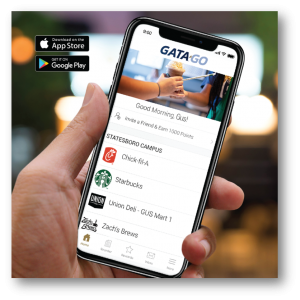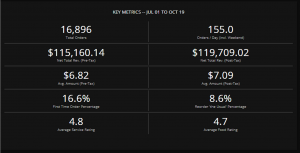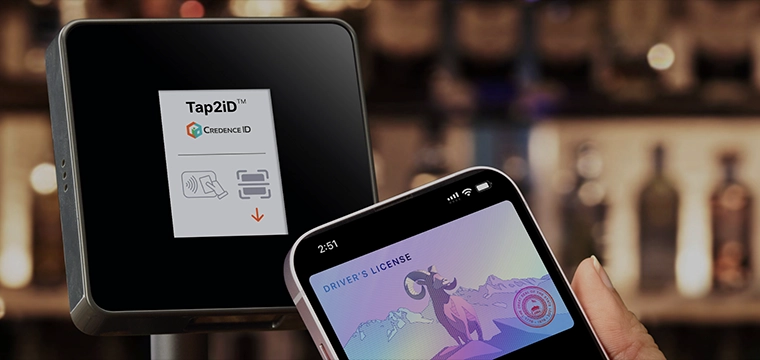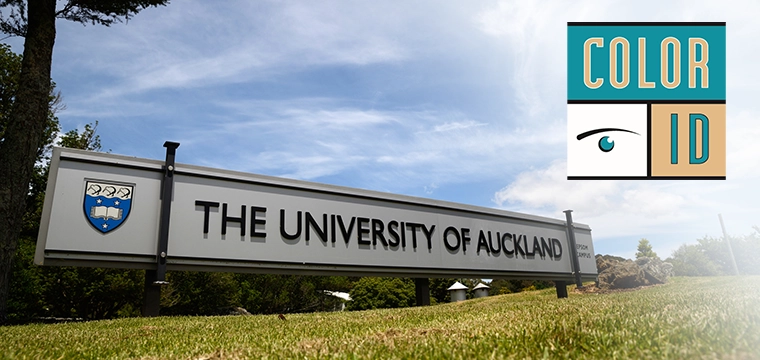
Georgia Southern University has been providing mobile ordering to its students since 2015 and has seen nothing but strong usage and order volumes year on year. But as the university’s contract with its mobile ordering provider was approaching renewal in June of 2019, the university began weighing its options.
A Transact campus client, Georgia Southern has an ecosystem on campus that’s well established, and any mobile ordering solution would need to integrate with that ecosystem. In July 2019, the university opted to implement Transact Mobile Ordering. Georgia Southern named the app “GATAGO” and launched with a university-branded, front-end user interface.
While the prior implementation of mobile ordering worked well and was extremely popular with users, the move to Transact Mobile Ordering solved some challenges in GSU’s in-house accounting reconciliation process. Additionally, Transact Mobile Ordering integrated seamlessly with both Georgia Southern’s existing QuadPoint POS ecosystem and a new Eatec inventory management system.
But changing providers for a service that’s as popular with students as mobile ordering doesn’t come without careful consideration.
“We were heavily on board with our previous mobile ordering solution from Tapingo for quite a while, and it was very successful,” says Richard Wynn, Director of the Eagle Card Program at Georgia Southern University. “So the concern I had was about change, and how the transition would work with our students.”

Were students really tied into the existing app? Would they object to using a new mobile ordering platform? These were questions that worried the team.
Wynn and the team at Georgia Southern decided to ease into its transition to Transact Mobile Ordering during the summer when things on campus are somewhat slower.
“Since moving to Transact Mobile Ordering, we've seen almost no issues, and our sales are only down a small amount, which is to be expected with a migration,” says Wynn. “It’s been successful for us. We’ve seen students taking to the new app and we've recorded really good numbers.”
When asked if mobile ordering was a main-line aspect of GSU dining operations, Wynn didn’t hesitate. “Absolutely. Right now, 10-15% of the overall daily orders at our Starbucks, Chick-fil-A and our other popular locations are now mobile orders placed through Transact Mobile Ordering.”
The change to Transact Mobile Ordering also meant an adjustment for GSU’s participating merchants.
“There were some features that Transact brought with its offering that the dining location managers like a lot,” says Wynn. “One example is they’re now able to use sticker printers instead of the printers that we had with our previous mobile ordering solution, which helps a lot in our Starbucks to better manage orders.”
“Transact Mobile Ordering has been successful for us. We’ve seen students taking to the new app and we've recorded really good numbers.”
The mobile ordering operation at Georgia Southern is purely pickup, no delivery, and all participating merchants, both national brands and local concepts, are located exclusively on-campus. At full capacity, GSU is running six dining locations on Transact Mobile Ordering, including a Chick-fil-A, Starbucks, a local coffee shop, a local sandwich shop, and a campus convenience store that also sells sandwiches.
The campus Chick-fil-A in particular, Wynn says, required some post-implementation troubleshooting.
“One of the initial challenges that came up was with Chick-fil-A. They are very specific with how long their food can sit,” Wynn explains. “They didn’t want anyone to put in an order and have that order fulfilled and sitting there for 10 or 15 minutes before pick up.”
To address this challenge Georgia Southern and Transact worked collaboratively on a solution.
“Initially the solution was a manual check in when the student arrived to the Chick-fil-A counter, but that ended up taking longer than standing in the normal line to order,” says Wynn. “So we worked with Transact and were able to create a mobile check-in feature that users, as they get close, tells Chick-fil-A that the student is on their way and that then prompts the order fulfillment.”
A mobile ordering system is only as effective as it’s backend reporting and reconciliation, and Georgia Southern’s operation had a few needs that had to be met.
“Transact Mobile Ordering is comparable to what we had before,” says Wynn. “But one of the big differences is that before all the back-end service used to be done by our mobile ordering provider.”
Georgia Southern dining is self-op and has its own accounting department so at times, the two systems were tough to keep in sync.
"Right now 10-15% of the overall daily orders at our Starbucks, Chick-fil-A and other popular locations are now mobile orders placed through Transact Mobile Ordering."
A caveat to this was that any problems that a customer had with an order would be handled by the mobile ordering provider. “They would then make some type of restitution separate to our records,” says Wynn. This caused challenges with reconciliation and he says that solving that issue was key to the migration.
As Wynn explains: “If someone placed an order on a Monday and later requested a refund – and let’s say that refund was issued on Tuesday but they run it against Monday’s end-of-day – it changes the deposit that was done for the end of the month. We’d complete our reports and send them to the bursar’s office, but those refunds would change the end-of-day reports. This meant that when we balanced our books at the end of the month, we had different numbers, which then meant we had to file discrepancy reports that created internal problems.”
Separate to all this, another wrinkle that was added to GSU’s previous mobile ordering ecosystem was the implementation of Agilysys’ Eatec inventory management system.
“Any sales that happened through QuadPoint – the POS we use at all our retail locations – that data goes back into the inventory management system,” explains Wynn. “But data from our previous mobile ordering provider did not sync with Eatec.”

Transact Mobile Orders placed at Georgia Southern between launch day July 1, 2019 and October 19, 2019.
Simply put, the institution decided that Transact Mobile Ordering would play well with the existing QuadPoint ecosystem and integrate seamlessly with the new inventory management system.
“Transact Mobile Ordering is just another register when you look at it from QuadPoint’s perspective, and we already had a way to get that data into our inventory management system. So it solved that problem for us,” explains Wynn. “And because nobody was going in and changing the deposits from the day before, that problem was also solved by moving to Transact.”
The move to Transact provided more control for dining managers and GSU admins. “All the payments we process, the reports, deposits, and end-of-days are all done through QuadPoint, so it was something we were already very used to and very comfortable with. It was a great benefit for us,” says Wynn.
Deciding on the right mobile ordering solution will be different for each campus. For the self-op environment at Georgia Southern, reporting and reconciliation complications, the implementation of a new inventory management system, and an approaching contract expiration were all key considerations in moving to Transact Mobile Ordering.
And while the decision to move providers paid off, Wynn hasn’t forgotten how far mobile ordering has come in just a few short years.
“Credit to Tapingo because they really showed us and proved to us that mobile ordering was a thing that students absolutely wanted and were willing to use,” says Wynn. “We saw the Tapingo orders go up and up every year. And if we still had that solution, that trend would probably continue.”
The case at Georgia Southern illustrates that it’s a pros-and-cons decision. Some campuses will benefit more from a platform that handles all the aspects of the operation, while other institutions will want to keep hold of some of the control. There’s no right or wrong answer, and ultimately it’s something that you can only discover after getting your hands dirty.
If you want more information on Transact Mobile Ordering, click here to check out an on-demand webinar with Xavier University. In addition to discussing the specific roles that both Xavier and Transact played in the university’s mobile ordering rollout, the webinar will also include outcomes and lessons learned.




